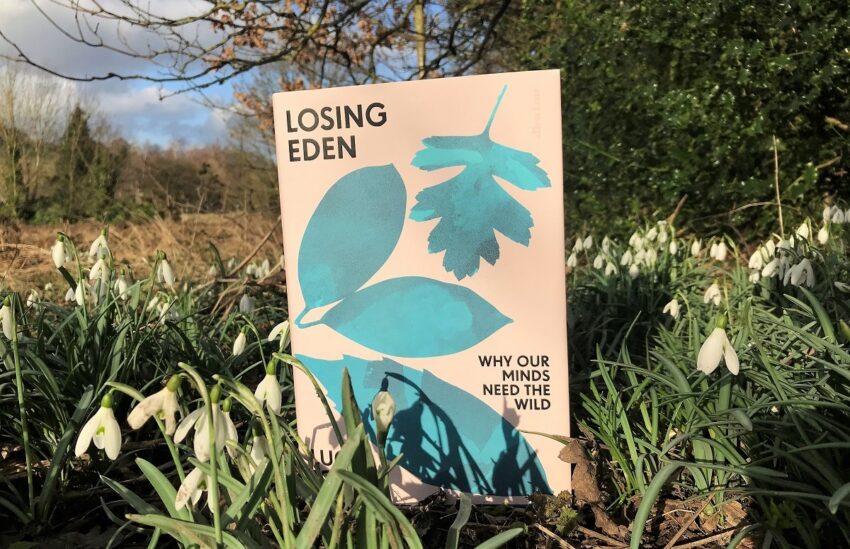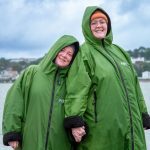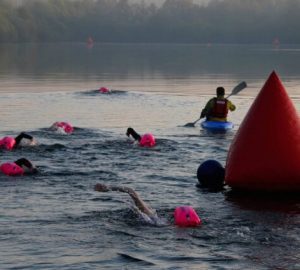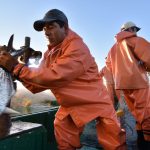Swimterview: Lucy Jones, author of Losing Eden
Missing the great outdoors and wild water? Ella Foote chats to Losing Eden Author Lucy Jones to discover why nature is so essential
As an outdoor swimmer you are probably acutely aware of how spending time out in the natural environment makes you feel good, but have you ever wondered why? Do you put it down to fresh air, natural daylight and exercise induced endorphins? Or have you ever considered negative ions or Attention Restoration Theory? Author Lucy Jones had become curious about how nature affected how she felt and started on a personal journey to discover why. It quickly became clear that she had stumbled into a fertile field of science and multiple scientific disciplines attempting to measure, explore and investigate why contact with nature benefits human health. In her new book, Losing Eden, she uncovers research that reveals just how important the natural world is and how we need to look after it.
Disconnection from nature
“I didn’t realise when I embarked on the research that there are many scientists on every continent, in every country of the world, right now looking into this relationship between nature and the mind. It was really fortuitous timing and exciting,” says Lucy. “And while I was writing there was a global realisation of climate change accelerating, species lost, habitat destruction, ecological grief and nature deficit disorder. There was a language to describe the disconnection from nature and people were starting to have feelings about the what we had done to the world. Terms like ecological grief and eco anxiety were in the mainstream media and there was study after study on how living on a road with trees was associated with fewer prescriptions for anti-depressants, why walking in a forest was good for your nervous system and why bacteria in soil enhances serotonin. I set out to look at why nature makes us feel good, but then as I was writing the question flipped and became more about why this estrangement from nature is bad for us.”
As a child and adolescent Lucy was always into nature, writing and craft. In her late teens and early twenties those interests were replaced with clubbing, partying and drinking before she got sober at 27. “As soon as I made that change, I was immediately drawn back to the natural world,” she says. “I found daily walks in Walthamstow marshes and swims in the sea in Scotland essential for keeping me on an even keel. I have always been a curious person, so I started asking myself, what is going on? Why is this happening? Obviously, everyone knows that spending time in the natural world has some good effects, but it was such a powerful affect I really wanted to find out what was happening. I wanted to get down to the nuts and bolts of it, how it affected my mind and body in different ways. Rather than just assuming it was because everything was beautiful and calming in green spaces.”
Lucy Jones
Radical noticing
Lucy and I are chatting over Skype, we are in lockdown because of Covid-19 and the world is looking really different. In the UK the public are being asked to stay at home unless they are a key worker, shopping for essentials or exercising once a day. In her book Lucy asks, ‘how can we collectively fall in love again with nature?’ It appears the pandemic has triggered an appreciation and stronger connection with the outdoors. “There has been an outpouring and need for seeing the living world,” says Lucy. “People have been desperate for signs of life, colour, beauty, shapes, sounds and all multisensory things that nature provides. More people are buying seeds and the RHS has seen an increase in people looking at how to home compost on their website. People are turning to nature, which makes sense because we are nature. We have evolved alongside nature and it has provided sustenance, comfort, interest and beauty for millennia. We had become so disconnected from the land and earth over many decades, but now when I go on Twitter and see a million different blossom pictures it feels different. I am seeing things I had never seen before on my usual daily walk, there is a radical noticing. People are seeing things they would have hurried past before, there is now a wonder, delight and joy at what is on the street or in cracks of the pavement. Evidence suggests that the more connection to nature we have, the more love and wonder we feel for nature, the more likely we are to have pro-environmental behaviours. Daily walks are becoming a new way to see the world perhaps?”
Restless, fidgety & trapped
As well as seeing an increase in people engaging with the outdoor and natural environments, there has been a significant decrease in activity for many who usually spend most or a lot of their time outdoors. Outdoor swimmers have been forced into bathtubs, paddling pools and wheelie bins in desperate attempts to get their fix. I have started to listen to recordings of babbling brooks, rushing streams and gentle waves while I work to give me some comfort. I have felt restless, fidgety, trapped and well, dry. I have turned to forest bathing, but it just doesn’t cut it, so not being able to swim outdoors, what is it that I am missing? In her book, Lucy often references her love of swimming. “Honestly, my favourite place to be in the world is in this one little river in Hampshire, lying on my back in the water, looking at the sky and trees, smelling the water mint. That to me is absolute heaven.”
The high we seek
In the book she describes how when she feels stressed out or flat, she goes for a swim in a river. She references what many outdoor swimmers have raved about for years, the fact that depressive symptoms are often improved, mood is boosted and tension released. ‘Cold water swimming acts as a stressor on the body which activates the sympathetic nervous system and increases hormones such as noradrenaline.’ It is this high that we seek and now missing. But it is not just what is in the water, but in the air around water too. Lucy discovered that, ‘Negative ions are more abundant around water and natural areas – rivers, beaches, waterfalls, mountains – anywhere that air molecules are broken apart by moving water, crashing waves, moving air or sunlight – than indoor, air polluted, air conditioned areas, where the number of negative ions falls significantly.’ If you don’t know about negative ions, they are invisible molecules that produce biochemical reactions that increase levels of serotonin improving mood disorders. “This was one of the things I was most surprised by,” says Lucy. “I had never heard about it before and I just stumbled upon it. It is a good, scientifically robust study. One of my swimming spots has this quick flowing water and often I sit there to just enjoy it, I wanted to know why I was so drawn to it, was it the movement of the water? This idea that water crashing together omitting ions makes a lot of sense, we can’t see it, so it is hard to know exactly what it is.”
There are many revelations within the book that I enjoyed. Like the concept of Attention Restoration Theory (ART), the idea that too much attention on one thing could lead to mental fatigue and trouble concentrating – Directed Attention and attention that requires no effort – Involuntary Attention. Involuntary Attention gives the brain a rest so that it can engage in Voluntary Attention – effort and concentration, when it needs to. I very much rely on my Involuntary Attention while swimming to help with effort and concentration in the rest of my life. “Swimming is the ultimate immersion in nature,” says Lucy. “It is a time where I feel, whether in the sea or a river, almost dissolving into the rest of nature. I am animal. It is a really primal thing, womb like.”
Creating a better society
As well as encouraging this reconnection to the natural world, Lucy is also conscience of her reciprocal relationship with it. “That is one of the dangers about writing about mental health and nature,” she says. “Asking what we can get from it, I am constantly thinking about reciprocity and how to be a good human in a river. Asking myself if I am disturbing habitats, creatures and stuff. I would love to be able to have more ceremony or way of expressing gratitude in a more formal way. It does feel spiritual, I feel like I am part of infinity, alfa and omega. I am in the trees; it is transcendental and like I am taking acid in nature. It just feels like home.” Looking to the future Lucy’s book is hopeful and positive. “I think the warnings from people like David Attenborough are starting to be heard,” she says. “This disaster altruism we have seen in this crisis, the coming together of people, the love that people have makes me more hopeful that we can create a better society, allowing the rest of nature to thrive, not for us, but because it should and deserves to.”

Losing Eden is the March issue of Adventurous Ink
Subscribe before the end of the month to receive Losing Eden as your free first month, plus a print copy of Future Horizons Past. Use the code FIRSTSWIM at checkout.









